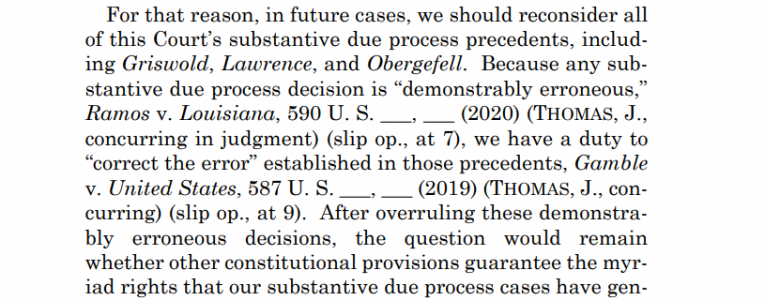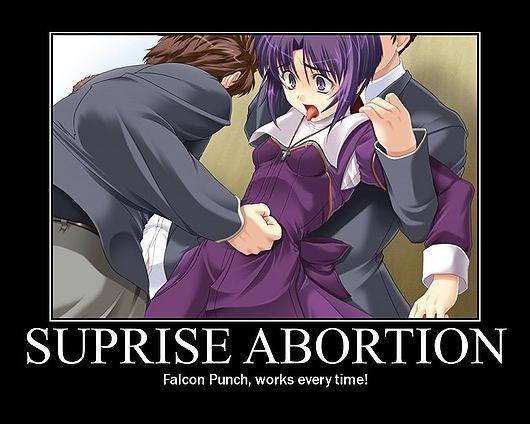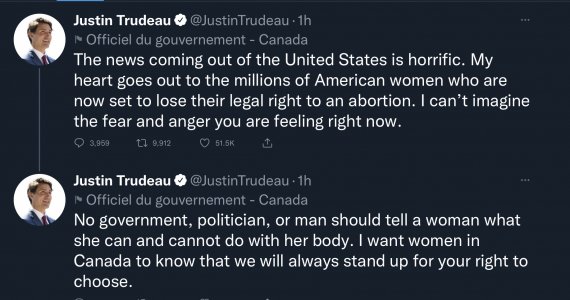There will be blood.Overturned.
You are using an out of date browser. It may not display this or other websites correctly.
You should upgrade or use an alternative browser.
You should upgrade or use an alternative browser.
Abortion Repeal?
- Thread starter Marauder06
- Start date
There will be blood.
Agreed sir.
I expect Trudeau to make some stupid announcement. Probably offering citizenship for every abortion refugee.
There’s a run on coat hangers at Dollar General.
- Joined
- Sep 12, 2012
- Messages
- 13,619
There’s a run on coat hangers at Dollar General.

I gotta be honest, I don't support or agree with abortions, but, I also don't believe any government should have a say in what women do with their bodies, let alone any human being.
It's medical tyranny. What's the answer?
It's medical tyranny. What's the answer?
I gotta be honest, I don't support or agree with abortions, but, I also don't believe any government should have a say in what women do with their bodies, let alone any human being.
It's medical tyranny. What's the answer?
If we're doing safe injection sites and handing out free narcan, why not free plan B? Or just leave it ambiguous and let private clinics offer the service. That's exactly how it's handled here.
Although it's available in Canada, it's not a protected right either. Trudeau should shut his hole, unless he's willing to open that shitstorm here and make it law. Even though many support it, I'm willing to bet many Canadian's; especially new immigrants, won't support it.
Canadian women have right to an abortion, Trudeau says. But it's not enshrined in the charter
https://www.cbc.ca/news/canada/abortion-rights-canada-morgentaler-court-1.6439612
Especially with Thomas' concurrence basically begging for cases to overturn Griswold, Lawrence, and Obergefell (or contraceptions, same sex relationships, and same sex marriage), because they were all decided in a similar way to Roe.There will be blood.
He for some reason didn't mention Loving (interracial marriage) even though that was also decided under the same parameters; I'm sure it's just an oversight and not at all his Religious views influencing him.
The conservatives already knew overturning Roe would cause a shit storm, but at least abortion is still a debated issue. For a judge to say he wants to make Sodomy laws legal again and take away access to contraceptives?
That's fucking crazy to think that won't be an issue with the majority of non-evangelicals.
That alone might galvanize people more than overturning Roe does.
What judge is saying he/she wants to reinstate sodomy laws and ban contraceptives?
Edited to add: ok I understand what you mean.
Clarence Thomas says Supreme Court should reconsider contraception, gay marriage rulings
Edited to add: ok I understand what you mean.
Clarence Thomas says Supreme Court should reconsider contraception, gay marriage rulings
Last edited:
Thomas, in his concurrence. He implies that all of those cases were also bad law like Roe and should be "corrected".What judge is saying he/she wants to reinstate sodomy laws and ban contraceptives?

Do I think it'll ever happen? Probably not, but the idea he's even suggesting that is pretty extreme.
Edit: I see you caught it right before I commented.
Topkick
Verified Military
for some reason didn't mention Loving (interracial marriage) even though that was also decided under the same parameters; I'm sure it's just an oversight and not at all his Religious views influencing him.
He's in an interracial marriage, so I doubt it has much to do with religion.
My concern is with the no exception laws in many states.
A D&C which my ex wife had early in pregnancy medical emergency is now illegal in the state she had it. We were two willing and consenting people trying to get pregnant. The D&C was to prevent further trauma from an unenviable pregnancy. That further trauma would have led to infection or loss of some reproductive organs. So what the hell do we do now?
It’s also troubling that their are not robust social structures to help various marginalized populations through pregnancies. Child abuse / child pregnancy is a concern. Foster care systems are hit and miss. Adoption agencies are not robust and expensive, and family units cannot be always relied upon to care for children.
We can’t be robust as a society if we’re absolutist with structures to account for life, because life certainly is not black and white. Reproductive health should not be this damned hard.
A D&C which my ex wife had early in pregnancy medical emergency is now illegal in the state she had it. We were two willing and consenting people trying to get pregnant. The D&C was to prevent further trauma from an unenviable pregnancy. That further trauma would have led to infection or loss of some reproductive organs. So what the hell do we do now?
It’s also troubling that their are not robust social structures to help various marginalized populations through pregnancies. Child abuse / child pregnancy is a concern. Foster care systems are hit and miss. Adoption agencies are not robust and expensive, and family units cannot be always relied upon to care for children.
We can’t be robust as a society if we’re absolutist with structures to account for life, because life certainly is not black and white. Reproductive health should not be this damned hard.
I think you misunderstood what I was getting at; I'm saying that his targeting of contraception, sodomy laws, and same sex marriage is likely based in religious views and not his stated opinion on due process.He's in an interracial marriage, so I doubt it has much to do with religion.
The court case that allowed interracial marriage was also decided on the same due process claim he says needs reviewed, but he doesn't mention that case in his examples.
I hope you'll allow me to rephrase your comment to make sure I understand.I think you misunderstood what I was getting at; I'm saying that his targeting of contraception, sodomy laws, and same sex marriage is likely based in religious views and not his stated opinion on due process.
"Contrary to Justice Thomas's stated opinion, I am saying that his ruling is likely based in his religious views, and not on his judicial opinion of due process."
If that is a correct re-statement of your point, could you flesh it out for me? How did you come to that opinion? Are there other examples you can present of Justice Thomas "likely" passing rulings "based in his religious views"?
I am probably ignorant on this one- I look forward to your illumination.
Edit: I apologize at the top, this is a much longer post than I intended it to be.I hope you'll allow me to rephrase your comment to make sure I understand.
"Contrary to Justice Thomas's stated opinion, I am saying that his ruling is likely based in his religious views, and not on his judicial opinion of due process."
If that is a correct re-statement of your point, could you flesh it out for me? How did you come to that opinion? Are there other examples you can present of Justice Thomas "likely" passing rulings "based in his religious views"?
I am probably ignorant on this one- I look forward to your illumination.
I am specifically saying that his choice of cases that should be revisited is based in his religious views, not his legal views. His ruling here reflects his longstanding veiw that the constitution grants no right to privacy and that the concept of substantive due process is wrong.
Griswold established the "right to privacy"(not due process) which allowed Roe. Roe in turn expanded both the concepts of due process and right to privacy that would eventually allow for Lawrence and Obergefell to be decided.
He's arguing that, because the due process and right to privacy used in Roe is "demonstrablely erroneous", these cases that use these precedents should be overturned.
So, my reasoning for stating that has to do with religion and not his legal theory is based in looking at the cases he chose to use as references and how those topics are looked at by Evangelic Christians(EC) and Conservative Catholics(CC).
Pretty easy off the jump, both EC and CC are pretty anti everything homosexuality.
The topic of same-sex marriage(Obergefell) is still one that has significant push back in a number of states, most recently in the news was Tennessee and the attempt to iintroduce a bill there that would create a seperate class of marriage just for hetero-couples.
Roe, Lawrence, and Griswold were all cited in this decision, so that's how they tie in here.
The same EC/CC mindset is likely why he brings up the case regarding sodomy laws(Lawerence). Now, outside of some real extreme religious circles, I've never seen any push to reinstate these laws. However, Thomas was on the court for this case; he dissented under the idea that there is no right to privacy (Griswold) in the Constitution. Roe was also cited in this case as well.
Lastly, contraceptives(Griswold). This one seems pretty out there until you spend time in CC circles. The official policy of the Catholic Church is still Humanae Vitae, which states that all forms of artifical contraception are inherently going against God's will.
This case was one of the first to establish the idea of a "right to privacy" and is vital to the other cases.
Now, from how Thomas writes his dissent, it's pretty clear he wants to overturn cases decided by the due process clause or "right to privacy".
Griswold makes sense from that prespective; it set a precedent which was later used in Roe and these other cases.
Lawerence and Obergefell don't though. They didn't really set any major precedent in regards to privacy or due process. The only thing that makes these two cases stand out from any other is that they both occurred during his time on the bench, he dissented in both under religious liberty and lack of due process views, and they both involve gay people.
You think if you wanted to revisit cases that started the right to privacy and due process, you'd go for both of the ones that set the precedent? That's what he's doing with Griswold and privacy.
Now, what case had the largest impact on the view of the due process clause that Thomas doesn't support? What played a larger role in Obergefell than Roe or Griswold? What helped expand the concept that caused the decision in Lawerence?
Loving V. Virginia
Loving was one of first cases to really expand due process to this level. The concepts of this case were fundamental in Roe, Lawerence, Obergefell, and basically every other case decided by "the due process clause of the 14 Ammendment".
If Thomas truly felt that the use of the due process clause is fundamentally flawed, this is the case to try and overturn. It's the first domino to overturning every other case he's dissented on those grounds.
Loving happens to be the case that legalized interracial marriage.
So if Thomas doesn't believe in this reading of due process and feels it should always be a state issue, why avoid this case? Overruling the precedent set here would negate Obergefell and Lawerence outright.
It's almost like his legal theory doesn't apply to cases in which he would be affected, but only in cases which don't match his religious views.
Apparently, pro-abortionists stormed Wisconsin's state capitol. Feds/state is hush on it. Guess, "insurrection" only happens if folks are wearing stupid, horned hats and not pink, vagina hats. Lol
Apparently, pro-abortionists stormed Wisconsin's state capitol. Feds/state is hush on it. Guess, "insurrection" only happens if folks are wearing stupid, horned hats and not pink, vagina hats. Lol
My chick was just telling me people are protesting in Salt Lake City as well. I guess the dumbass people are too busy to realize this was a "federal Supreme Court" ruling and had nothing to do with state level government...
Pink hair, armpit hair, fucking face attacked my a nail gun, screaming at the top of her lungs, "dad I can't believe you didn't take mom's birth control for her, how could you allow me to be born into this world"...
I swear these stupid ass motherfuckers are getting dumber and dumber by the day.
Similar threads
- Replies
- 5
- Views
- 4K



